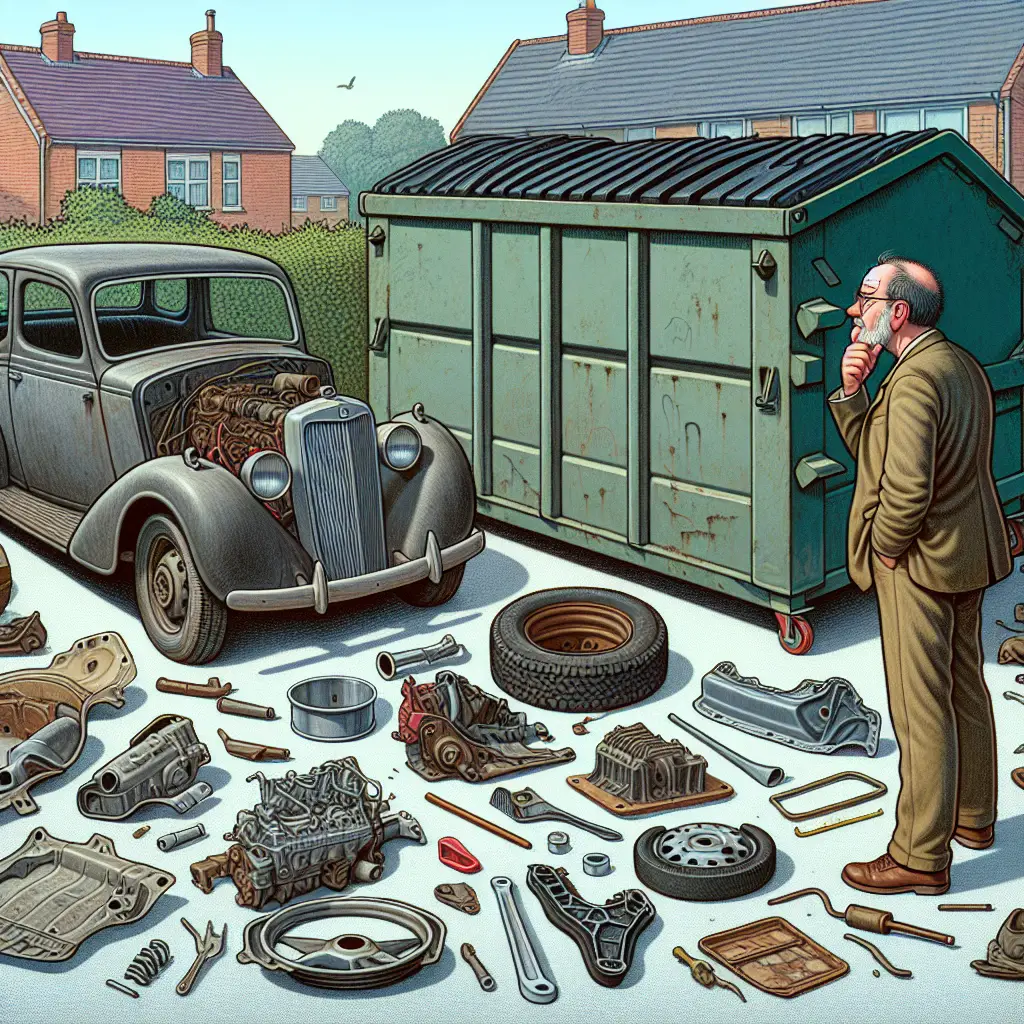Can I Put Old Car Parts In A Dumpster Rental?
When you’re tackling an automotive project or clearing out your garage, you might find yourself with a pile of old car parts that need disposing of. The convenience of a dumpster rental might seem like the perfect solution for getting rid of bulky metal components, but before you toss those old parts into the bin, it’s important to consider the rules and best practices.
First, the short answer: it depends. Different dumpster rental companies have varying policies on what you can and can’t throw away, and local regulations may also play a role. So let’s shift gears and explore the ins and outs of disposing of old car parts in a dumpster rental.
Understanding Dumpster Rental Policies
The first step in figuring out whether you can put old car parts in your rented dumpster is to check with your dumpster rental provider. Most companies will provide you with a list of items that are prohibited. Generally, hazardous materials, tires, batteries, and fluids are often on the no-go list.
If you’re planning to rent a dumpster, companies like Griffin Waste Services typically have clear guidelines on what they will and will not accept depending on their location. Follow their advice to ensure you don’t incur any penalties for improper disposal.
Local Regulations on Waste Disposal
It’s also crucial to consider your local waste disposal regulations. Municipalities have rules about what can be disposed of in landfills. For instance, certain metals might be considered recyclable material and therefore shouldn’t be thrown in a dumpster. Local government websites or your community’s waste management department can provide this information.
Why Some Car Parts Are Prohibited
You might wonder why you can’t just throw all car parts into a dumpster. Well, certain components are harmful to the environment or pose a risk to the health and safety of waste management personnel. Items like car batteries contain lead and acid, which are considered hazardous waste.
Furthermore, tires can damage landfill structures and potentially cause fires, which are difficult to extinguish due to their composition. And let’s not forget the various fluids in a car – oil, antifreeze, brake fluid – these can contaminate soil and groundwater and are a definite hazard.
The Right Way to Dispose of Car Parts
Options for disposing of car parts responsibly depend on the type of part. Here are some alternatives:
- Metals: Steel and aluminum parts can often be recycled. Scrap yards and metal recycling centers are typically equipped to handle these materials. By visiting websites like RecycleNation, you can find recycling locations near you.
- Tires: Old tires can be taken to tire shops or recycling centers that specialize in processing them. Some communities also hold tire amnesty days where you can dispose of them free of charge.
- Batteries: Auto parts stores and recycling centers often accept car batteries for recycling. Remember that these can’t go in the dumpster due to their hazardous materials.
- Oil and Fluids: Many auto parts stores and service centers will take your used motor oil and other vehicle fluids for proper disposal. Never dump these into the dumpster or on the ground.
Reducing and Reusing Car Parts
Before you decide to dispose of old car parts, consider if they can be reused or repurposed. Some enthusiasts and artists find creative ways to give car parts a second life – think furniture, yard art, or even DIY projects.
There are also numerous forums and online marketplaces like eBay Motors where you can sell usable components. This not only prevents waste but could earn you a little cash.
Best Practices When Using a Dumpster for Car Part Disposal
- Know the Guidelines: Always start by understanding the rules of your dumpster rental company and your local waste disposal regulations.
- Prepare Car Parts Appropriately: Drain all fluids, separate recyclables, and ensure that parts are free of hazardous materials before considering dumpster disposal.
- Consider the Environment: Opt for recycling or repurposing as your first choice to minimize environmental impact.
- Be Honest: If you’re unsure whether a part can go in the dumpster, ask your provider. It’s better to be safe than sorry!
Conclusion
Disposing of old car parts in a dumpster rental isn’t as straightforward as it may seem. While metal components might be fine, many parts require separate disposal due to their potential environmental and health hazards. Always explore recycling and reuse options first, and if you do use a dumpster, keep it legal and eco-friendly.
Remember, proper disposal of car parts isn’t just about following the rules – it’s about showing respect for our planet. With a little bit of knowledge and effort, you can ensure that your automotive waste is handled responsibly.
Are you knee-deep in an automotive project and need to get rid of parts responsibly? Or perhaps you’re simply clearing out space and stumbled upon a trove of old car parts? Taking the time to dispose of these items properly can save you from fines and help preserve the environment. So before you haul that old engine block or pile of batteries towards the bin, pause and plan the right approach for a cleaner, greener disposal.

